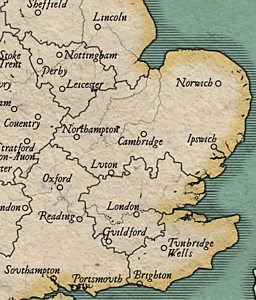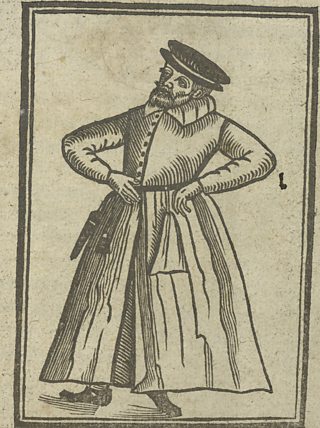Shakespeare's company get the cold shoulder from Norwich
The only two recorded visits of Shakespeare’s players to Norwich – then as the King’s Men – occurred after Shakespeare had passed away.
They weren't warmly welcomed in a city known for its Puritanical population.
-
![]()
Much ado near me
Hear more Shakespeare stories on BBC Radio Norfolk
-
![]()
Shakespeare Festival 2016
The BBC celebrates the genius of the bard

Even then it is not clear if they actually performed. Certainly on the first visit recorded in St Andrew’s Guild Hall in June 1622 the actors were paid a total of 40 shillings not to perform, presumably so as not to upset the Puritans.
On the first visit recorded in St Andrew’s Guild Hall in June 1622 the actors were paid a total of 40 shillings not to perform, presumably so as not to upset the Puritans.
However, the same company does not appear to have been put off, returning again to Norwich at some point in 1622-3 – once more to St Andrew’s Hall – when they were paid the same amount, though it’s not clear whether they performed or were again paid to clear off.
By this time Shakespeare had been dead for more than six years, but his plays continued to form a staple part of the King’s Men’s repertory, and would therefore have been available for a performance in Norwich.
The players might have offered to perform for example, Twelfth Night, which is the play they chose to perform back at court in London during the Christmas season of 1622-3, although its satirical treatment of Lady Olivia’s puritanical steward, Malvolio, might have proved risqué in a city like Norwich, known as it was, for its own puritanical leanings.

Norwich's puritanical reputation may have put Shakespeare off
Around the time of the late 16th century and early 1600s Norwich was one of the largest cities outside of London, with a population of around 10,000 people. No doubt these large numbers of people together with the relative prosperity brought by the wool trade and other local industries attracted early modern drama groups such as Shakespeare’s.
Norwich became a well-known centre for Puritanism…a movement often associated with opposition to the theatre.
At the same time it was also a challenging region in which to perform, particularly from the middle part of the 16th century onwards, when Norwich became a well-known centre for Puritanism, a movement often associated with opposition to the theatre.
Although civic records show payments to visiting performers in the late sixteenth century, Shakespeare’s company of the time, the Lord Chamberlain’s Men, is not listed among them.
By Dr Siobhan Keenan, Reader in Shakespeare and Renaissance Literature, De Montfort University, Leicester
The Puritanical backlash against theatre
One of the most peppery of the Puritans in Elizabethan times is the pamphleteer Philip Stubbes.
Stubbes is perhaps best known for his popular book The Anatomie of Abuses (1583) in which he claims to expose some of the supposed ‘abuses’ in Elizabethan society and the theatre comes in for particular stick.
In Shakespeare and other dramas of the day it is the men who also play female parts. Stubbes and his supporters, known as anti-theatricalists, refer to men who dress up as women as “monsters of both kinds, half women, half men”. They consider such cross-dressing as a depravity.
Carrie Blais, commentating on the life of Philip Stubbes, writes: “Although stage cross-dressing was a necessity brought about by the all-male Elizabethan stage (women in England were barred from performing on the public stage until after 1660), critics have noted that Shakespeare’s use of cross-dressing is complex, and in fact may question the patriarchal structures of his time.
“Shakespeare attempts to undo the policing of gender boundaries and this attempt may perhaps be partly why the anti-theatricalists were so anxious about 'real' gender boundaries.”
Stubbes also argued that plays were magic. They had the power to turn men into aggressive beasts on stage – and that audiences might be drawn into the magic by imitating what they see.
Dismissing them as "filthy plays and bawdy interludes" Stubbes goes so far as to accuse them of being the work of the devil.
His work was a big success – it had four editions – clearly striking a chord with like-minded Puritans who also believed, like Stubbes, that "leisure leads to vice".

Shakespeare on Tour
From the moment they were written through to the present day, Shakespeare’s plays have continued to enthral and inspire audiences. They’ve been performed in venues big and small – including inns, private houses and emerging provincial theatres.

BBC English Regions is building a digital picture which tracks some of the many iconic moments across the country as we follow the ‘explosion’ in the performance of The Bard’s plays, from his own lifetime to recent times.
Drawing on fascinating new research from Records of Early English Drama (REED), plus the British Library's extensive collection of playbills, as well as expertise from De Montfort University and the Arts and Humanities Research Council, Shakespeare on Tour is a unique timeline of iconic moments of those performances, starting with his own troupe of actors, to highlights from more recent times. Listen out for stories on Shakespeare’s legacy on your BBC Local Radio station from Monday 21 March, 2016.
You never know - you might find evidence of Shakespeare’s footsteps close to home…
Craig Henderson, BBC English Regions
Just who were the King's men?
The King’s Men was the acting company of which Shakespeare was a member for most of his writing and acting career.

They were known as the Lord Chamberlain’s Men during the reign of Elizabeth I and become the King’s Men by the royal decree of King James I when he came to power in 1603.
In the royal patent of 1603 the King’s Men were named as Lawrence Fletcher, William Shakespeare, Richard Burbage, Augustine Phillips, John Heminges, Henry Condell, William Sly, Robert Armin, Richard Cowley…”and the rest of their associates…”.
By the time of the troupe’s visit to Norwich in 1622/3 several of the actors named in the patent had already died.
Their leading playwright, William Shakespeare, died in 1616, and his lead actor Richard Burbage, who played Shakespeare’s demanding male parts – Richard III, Othello, King Lear, Antony and Macbeth – never retired from the stage and continued acting until his death in 1619.
Shakespeare’s role as leading playwright was taken up by King’s Player Lawrence Fletcher and various collaborators.
In 1623, around the time of their visit to Norwich, a new clown had joined the troupe, William Rowley.
And while they continued to perform Shakespeare’s works, the King’s Men took on productions from other writers including Thomas Middleton’s 'A Game at Chess' and John Webster’s 'Duchess of Malfi'.
The closure of theatres in 1642, as the Puritans took control in parliament at the beginning of the English civil war, marked the end of Shakespeare’s famous acting troupe.
-
![]()
Shakespeare Lives
The nation’s greatest performing arts institutions mark 400 years since the Bard's death
Related Links
Shakespeare on Tour: Around Norfolk
-
![]()
Echoes of the past: did medieval hall host the Bard?
Was Shakespeare in King's Lynn?
-
![]()
Sarah Siddons visits the Theatre Royal
Siddons' last Norwich performance of 'As You Like It'
-
![]()
Shakespeare's former clown dances to Norwich
Why did Will Kemp dance 125 miles from London to Norwich?
Shakespeare on Tour: Around the country
-
![]()
Whitby, wealth and a Shakespearean bachelor night
The Bachelors of Whitby sponsor a performance of Merchant Of Venice
-
![]()
A new king and rebranded Shakespeare’s players head first for Shrewsbury
James I established the ‘King’s Men’ as his official group of theatre players
-
![]()
Shakespeare's men perform before the King at Wilton in Salisbury
A royal audience in Salisbury
-
![]()
Caludon Castle: Did Shakespeare perform here for ‘Henry the Harmless’?
Was Shakespeare there during the 1593 'Plague Tour'?










